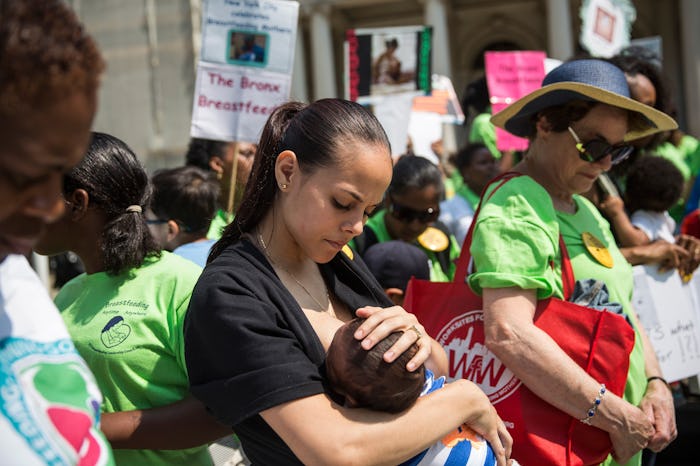Life

Here's Why Many British Women Stop Breastfeeding Early
Breast is best, if it's possible for mothers, but for many mothers in the United Kingdom, formula is the solution. Although health experts agree that babies should primarily drink breast milk, in Britain, there are barriers that keep that from happening. New data shows that more than half of British women don’t breastfeed after two months.
The World Health Organization recommends that mothers exclusively breastfeed for the first six months. Breastfeeding reduces babies' chances of respiratory infections, lowers a mother’s risk of ovarian and breast cancer, and is a source of bonding.
But despite all of these benefits, breastfeeding rates in Britain drop off drastically before the two-month mark, when just half of mothers are still giving it a go. A survey of 500 mothers by National Health Services and Public Health England asked women why they stopped breastfeeding. And the most common answers were because it could be painful (74 percent), it prevented them taking medication (71 percent) and because it is embarrassing to do in front of strangers (63 percent).
“We can all help women feel comfortable breastfeeding their baby wherever they are," Public Health England’s chief nurse, Viv Bennett, told The Guardian. "Creating a wider culture of encouragement and support will help make a mother’s experience all the more positive.”
Anna Burbidge, a spokesperson for La Leche League of Great Britain, tells Romper about some of the barriers to breastfeeding women face:
Since becoming a 'bottle feeding' society women have lost the knowledge of what is normal when breastfeeding and lack the support system around them that previous generations would have had. Marketing and promotion of formula can also undermine breastfeeding...Pressure to return to work, and lack of support for breastfeeding in the workplace, also influences women's decision.
To combat the problem of women having trouble breastfeeding upon returning to work, in 2016, The World Breastfeeding Trends Initiative wrote that women should be allowed paid breaks to breastfeed or express milk, and should be guaranteed suitable facilities for doing so.
“We have known that breastfeeding rates aren’t great in the U.K. for a long time,” Amy Brown, a professor in Public Health at Swansea University, told The Guardian last year. “We have about 80 percent of women starting breastfeeding at birth, but by the end of the first week, over half of those babies have had formula in some way.”
Breastfeeding rates in Britain are a stark contrast to rates in the United States. Like Britain, 80 percent of mothers start off breastfeeding, and more than half are still breastfeeding by the time their baby reaches 6 months of age, according to the Centers for Disease Control and Prevention.
Another interesting contrast between the countries is who is breastfeeding. While low-income black mothers have the lowest breastfeeding rates in the United States, in the United Kingdom, black and Asian moms have the highest breastfeeding rates, studies show.
But in order to encourage all mothers to breastfeed exclusively, public campaigns to raise awareness about the importance of breastfeeding need as much funding as possible. Instead, last year several breastfeeding support organizations reported cuts to funding.
"Women who do not receive help or support with problems after giving birth are more likely to stop breastfeeding within two weeks," Burbridge says.